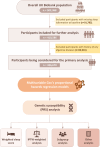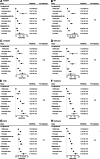Sleep patterns, genetic susceptibility, and digestive diseases: a large-scale longitudinal cohort study
- PMID: 38781035
- PMCID: PMC11392193
- DOI: 10.1097/JS9.0000000000001695
Sleep patterns, genetic susceptibility, and digestive diseases: a large-scale longitudinal cohort study
Abstract
Background: Sleep problems are prevalent. However, the impact of sleep patterns on digestive diseases remains uncertain. Moreover, the interaction between sleep patterns and genetic predisposition with digestive diseases has not been comprehensively explored.
Methods: Four hundred ten thousand five hundred eighty-six participants from UK Biobank with complete sleep information were included in the analysis. Sleep patterns were measured by sleep scores as the primary exposure, based on five healthy sleep behaviors. Individual sleep behaviors were secondary exposures. Genetic risk of the digestive diseases was characterized by polygenic risk score. Primary outcome was incidence of 16 digestive diseases.
Results: Healthy sleep scores showed dose-response associations with reduced risks of digestive diseases. Compared to participants scoring 0-1, those scoring 5 showed a 28% reduced risk of any digestive disease, including a 50% decrease in irritable bowel syndrome, 37% in non-alcoholic fatty liver disease, 35% in peptic ulcer, 34% in dyspepsia, 32% in gastroesophageal reflux disease, 28% in constipation, 25% in diverticulosis, 24% in severe liver disease, and 18% in gallbladder disease, whereas no correlation was observed with inflammatory bowel disease and pancreatic disease. Participants with poor sleep and high genetic risk exhibited approximately a 60% increase in the risk of digestive diseases. A healthy sleep pattern is linked to lower digestive disease risk in participants of all genetic risk levels.
Conclusions: In this large population-based cohort, a healthy sleep pattern was associated with a reduced risk of digestive diseases, regardless of genetic susceptibility. The authors' findings underscore the potential impact of healthy sleep traits in mitigating the risk of digestive diseases.
Copyright © 2024 The Author(s). Published by Wolters Kluwer Health, Inc.
Conflict of interest statement
None.
Figures




References
-
- Kocevska D, Lysen TS, Dotinga A, et al. . Sleep characteristics across the lifespan in 1.1 million people from the Netherlands, United Kingdom and United States: a systematic review and meta-analysis. Nat Hum Behav 2021;5:113–122. - PubMed
-
- Wang Y, Huang Y, Chase RC, et al. . Global burden of digestive diseases: a systematic analysis of the global burden of diseases study, 1990 to 2019. Gastroenterology 2023;165:773–783.e15. - PubMed
-
- Sperber AD, Bangdiwala SI, Drossman DA, et al. . Worldwide prevalence and burden of functional gastrointestinal disorders, results of rome foundation global study. Gastroenterology 2021;160:99–114.e3. - PubMed
MeSH terms
LinkOut - more resources
Full Text Sources
Medical

